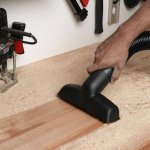The term “Shop-Vac” is a brand that has become synonymous with wet/dry vacuums.
Wet/dry vacuums are a specialized vacuum that is designed to collect larger pieces of debris and liquids in workshop environments.
The term has now been adopted by many in the industry for any vacuum which is going to be able to get through an industrial type of work.
Shop Vac vs Home Vacuums
They might look quite similar to regular vacuums in many respects but they are a lot different in terms of usability. The demands of this type of vacuum are much higher than the one you’ll use in your home. For example:
Size of debris – A Shop Vac will be able to pick up a lot of material that regular vacuum can’t. This could be chips of wood, water, glass, nails or anything else which might be waste material in a workshop.
Power – Perhaps the biggest difference is the power. These machines are a lot more powerful and also make a lot more noise than their domestic cousins.
Size – Shop Vacs are generally bigger than home vacuums. They are sized by how many gallons they are able to hold in the tank. These can be as little as 1 gallon for smaller vacs and go up to 20 gallons for industrial-sized models.
Durability – The build quality on Shop Vac’s have to be superb. With the type of material that is traveling through them, they have to be made out of durable materials with heavy-duty hoses.
Liquid – The Wet Dry Vacuums are going to be able to suck up water as well as debris. This is not something that regular machines can offer.
What is a Shop Vac Typically Used For?
Shop vacs have many uses, even though they get their name from a workshop, they are generally used wherever there is construction going on and large pieces of debris or water need picking up.

Liquid spills – Shop vac becomes particularly useful when it comes to clearing large amounts of liquid from floors which would otherwise require a mop and bucket – which can take much longer.
Construction sites – The more industrious shop vacs can also be used in settings where you get larger and heavier pieces of debris to clear up. These vacs can make light work of these worksites making cleaning much easier.
Blowing – Many models have the function of blowing as we as suction. This makes them versatile in blowing away debris, dirty or mess away from an area.
Home use – They are even handy around house… being able can move water, blow up inflatables and unclog drains as well as many other uses depending on the type you have. The smaller models have a high range of portability being in cordless models and can be very useful.
The different Shop Vac features

Power – These vacs will have a motor which is generally rated in horsepower (HP). The smaller models will often have a HP of around 2 or below with a high-powered model being able to reach a HP of up to 5 or more.
Tank capacity – The tank capacity is simply how much debris or water the vac is going to be able to store. 5 gallons or under is in the smaller end of the scale with some models being able to give you well over 10 gallons of capacity.
Filters – Choosing the right filter is important and this will depend on what type of job you are doing. In a lot of instances, a reusable dry filter or a small cartridge filter will be fine. In other instances, you might want to add a HEPA filter in order to remove fine dust.
Blowers – Being able to switch the direction of the motor and blow away material can be very useful for clearing debris. Not all Shop Vac’s have this feature, therefore, you want to look out for it if it will be useful to you. Shop vacs are also available with blowers for that specific job.
How they are powered – Despite their high power, there are some great cordless shop vacs out there. If you need a greater demand for portability, then this could be perfect for you. For those in a stationary workshop, the continuous power of a corded model may be a better option.

Reader Interactions